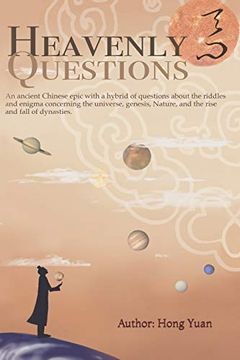Heavenly Questions: An Ancient Chinese Epic With a Hybrid of Questions About the Riddles and Enigma Concerning the Universe, Genesis, Nature, and the. Cosmology, Mythogeography & Theology)
Synopsis "Heavenly Questions: An Ancient Chinese Epic With a Hybrid of Questions About the Riddles and Enigma Concerning the Universe, Genesis, Nature, and the. Cosmology, Mythogeography & Theology)"
Heavenly Questions was a rhythmic poem that inherited the ancient tetrasyllabic characteristic of Shi-jing (book of poems) of four line stanzas. Ancient historians called the poem by the “heavenly questions” to revere the heaven as a high lord that could not be challenged with direct questioning. The poem has more than 170 questions, i.e., a hybrid of questions about the riddles and enigma of the ancient history concerning the universe, the Genesis, the Nature, myths and legends, and the rise and fall of dynasties. The poem had a question asking who was the creator of Nv-wa: “Nv-wa you [possessing] ti [body], shu [who] zhi-jiang [prototype-develop] zhi [it]?” The Nv-wa question was the earliest recorded agnosticism in the ancient Chinese literature that expressed the doubts about the existence of unknown or unknowable god or gods and the divine and supernatural beings, much earlier than the theories proposed by Thomas Henry Huxley.Heavenly Questions could serve as a watershed line to timestamp the creation time of the ancient legends and myths and separate the writings into the Waring States time period (475-221 B.C.) versus the Han dynasty (202 B.C.-A.D. 220). Whatever legends and myths carried in the poem should be treated as earlier, or otherwise should be treated as invention of the Han dynasty. In the case of Xia King Qi's five sons versus the 5th son as seen in the Warring States sophistry writings, Heavenly Questions stated that the Xia king for several times rose to the sky to be the high lord’s guest and received the award of ‘jiu-bian’ (nine encore [elegies]) and ‘jiu-ge’ (nine songs), and in the counter-theme in the latter part of stanza of the quatrain, the poem questioned why the king caused the sons to agitate around, i.e., the rebellion of five sons and the crackdown by Count Peng-shou in Chang Mai (surrendering the wheat as sacrifice) of Yi Zhou Shu (extant Zhou dynasty book), and his mother to have the caesarean birth, and why after the king’s death, the Xia kingdom disintegrated. In Heavenly Questions , there was the ancient concept of ‘ba zhu’, namely, eight pillars or struts that propped up the heaven from the earth, a much earlier concept that was not the same as ‘si ji’ (four polars) in Lv-shi Chun-qiu (master Lv Buwei's spring & autumn) or ‘ba ji’ (eight polars) in Huai Nan Zi (King Huainan's discourse) –a term David Pankenier translated as ‘culmen’. The value of Heavenly Questions could also be substantiated by the excavated stelle Zu Chu Wen (cursing Chu) timestamped Qin King Huiwenwang’s 26th year or 312 B.C., on which the Chu king was cursed as ‘kang-hui’, i.e., the legendary water god Gong-gong who broke the heaven’s pillar. Heavenly Questions was taken by the Soong dynasty scholars to be the source feed for the other ancient divination, cosmology and mythogeography books. The artificial marks were detectable about the cause and effect of Shan Hai Jing (Legends of Mountains & Seas) and Heavenly Questions, with some paragraphs of the seas’ section of Shan Hai Jing being written as the extended interpretation of the latter, such as Shang ancestor-king Wang-hai. Shan Hai Jing, in randomly calling Wang-hai as someone from the Gou-surnamed Kun-min state, could have switched on the unbridled fantasy by extrapolating on the ‘kun’ (trapped/entrenched) hexagram in Zhou Yi (Zhou dynasty divination) or Gui-cang Yi (returning-to-earth storage divination). In “great northern wilderness” of Shan Hai Jing, there was a similar story about the Yi1-surnamed Xiu-ge person, a purported great grandson of Lord Yu, who was let go to become the famed Mao-min hairy people over the ‘manslaughter’ crime of killing the Chuo-ren people. The poem deserves to be called epic for the all-encompassing coverage of mundane and divine topics.

